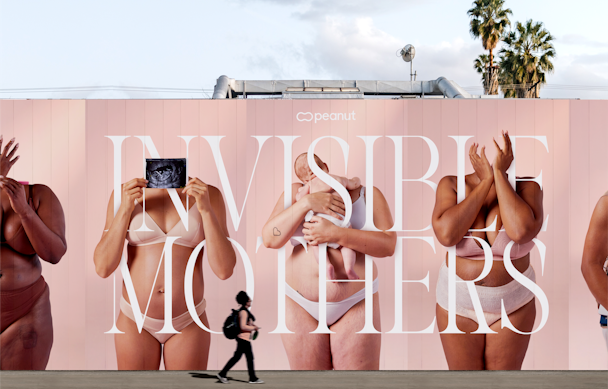Peanut shows raw side of motherhood in striking ‘faceless’ campaign
The ‘Invisible Mothers’ work will run in the UK and US.

Invisible Mothers, Peanut
IVF injection bruising, pregnancy loss, postpartum recovery and mental health struggles are all addressed in a powerful new campaign from Peanut, an online community for mothers that boasts 3.5 million users.
“When Peanut launched in 2017, the landscape of motherhood was very different. People weren’t talking about taboo topics. What you see on Instagram, it’s the joys and highlights, but the reality of what goes on behind the scenes can be quite different,” explains Hannah Hastings, vice-president of brand and communications at the platform.
Advertisement
“We want to shine a light on the reality of what women are going through. It’s great that conversations happen on Peanut, but we want to shout about it. Because if we keep talking about it among people living it, we won’t encourage any change, right?”
The company’s in-house creatives developed the idea of ‘Invisible Mothers’ in May after delving into Instagram analytics and the trending topics among the Peanut community.
“This concept of invisibility was consistently engaged,” says Hastings.
It embarked on a research project involving over 3,600 women, who shared their experiences, silent battles and unvoiced frustrations. It found that 72% felt invisible in their motherhood journey and that 46% didn’t feel supported by the healthcare system post-birth. Overall, 70% were expected to have more support from societal infrastructure than they do.
Advertisement
The work aims to appeal to society to recognize, understand and support every dimension of motherhood. But to ensure people took notice, Hastings says it needed to go bold with the creative executive.
“We wanted to show the reality of it and what goes on behind the scenes, whether it’s IVF bruising, bleeding or scarring from estrogen patches. It was important for us to put something out in the world that was thought-provoking, perhaps even a bit jarring. So people stop and think. Because women are talking about it on Peanut, these images are being shared there. In fact, there’s even more being shared. So if we weren’t showing the reality of it, it wouldn’t have been authentic to the message of the campaign.”
All those featured in the work are real women, mostly Peanuty users, who have lived the experience they are trying to portray. The in-house team then worked with photography studio The Gate, which shot and edited the images to remove their faces.
Suggested newsletters for you
But beyond the striking visuals, Hastings says it was essential to make sure people who saw the work could access practical advice and tools on how to support women and foster conversations that are more empathetic and won’t contribute to any feelings of invisibility.
This comes in the form of a platform called The State of Invisibility, which includes the most common unwanted questions from society that contribute to feelings of invisibility alongside alternative suggestions that women say they would prefer to hear. For example, it says that instead of always asking, ‘How is the baby?’ people should ask, ‘How are you really? Mentally, emotionally and physically?‘
It also includes details about solutions women want to see in society. These recommendations have also been formatted into creative graphics that will be shared as part of the campaign.
“We were introducing this just to say, ‘There’s a lot of work to do here, but these small changes can have really big impacts,’” says Hastings.
Peanut is prioritizing organic reach with the work: social media, digital, video, email and PR. It’s also relying on its Peanut “super users” to help spread the message.
Once it understands which messages resonate most with people, it will invest paid media into optimizing those elements of the campaign, including OOH.
“I would love to see this somewhere super disarming, in the financial district of the city of London or in New York. It’s so important that we put this in front of people who are going to stop in their tracks. We can’t just keep showing it to women and mums who already get it.”

